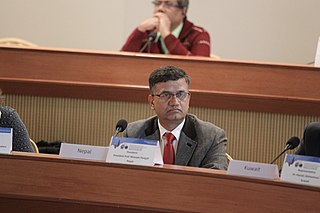
Archie Fairly Carr, Jr. was an American herpetologist, ecologist, and conservationist. He was a Professor of Zoology at the University of Florida and an acclaimed writer on science and nature. He brought attention to the world's declining sea turtle populations due to over-exploitation and habitat loss. Wildlife refuges in Florida and Costa Rica have been named in his honor.

The Nepal house martin is a non-migratory passerine of the swallow family Hirundinidae. Its two subspecies breed in the Himalayas from northwestern India through Nepal to Myanmar, northern Vietnam, and just into China. It occurs in river valleys and rugged wooded mountain ridges at heights between 1,000–4,000 m (3,300–13,100 ft) altitude, where it nests in colonies beneath overhangs on vertical cliffs, laying three or four white eggs in an enclosed mud nest.

Ravindra Kumar is a Political Scientist, Peace Educator, an Indologist, a Humanist, Cultural Anthropologist and a former Vice-Chancellor of CCS University, Meerut (India).

Dharma Ratna Tuladhar, popularly known as Dharma Ratna Yami was a Nepalese government deputy minister, activist and Newa language writer

Amrit Campus is the first science campus of Nepal, located in Lainchaur, Kathmandu. It was formerly known as Public Science College (PUSCOL.) It was later renamed in the memory of Amrit Prasad Pradhan. Pradhan was born in 1918 at Thamel, Kathmandu, Nepal. He worked as the headmaster of Juddhodaya Public High School in Birgunj for two years and later joined Tri-Chandra College as a lecturer in chemistry. In 1962, he became the founding principal of Public Science College and began teaching as a professor of chemistry.

Sudarshan Mahasthavir (1938–2002) was a Nepalese Buddhist monk and author who played a major role in the development of Theravada Buddhism in Nepal and Nepal Bhasa literature. He was jailed by Nepal's repressive Panchayat regime for his activities supporting language rights.
Prof. Ram Raj Pant (1920–1993) was a pioneering linguist of the Nepali language, literary writer and promoter of legal education in Nepal. In addition to publishing multiple volumes on Nepali linguistics, Ram Raj Pant led the establishment of Nepal Law College and was its founding Principal. Nepal Law College later became Nepal Law Campus under the Tribhuvan University.
Krishna Bhattchan a Nepali sociologist and indigenous activist. He is a Professor of Sociology at the Central Department of Sociology and Anthropology at the Tribhuvan University. He received his graduate degree in sociology from Banaras Hindu University. Thereafter he received his doctorate from the University of California, Berkeley.

Dor Bahadur Bista is a Nepalese anthropologist, social scientist and activist. Bista is considered the Father of Nepali anthropology, and has published popular books such as Fatalism and Development and People of Nepal. Bista mysteriously disappeared in 1995.

Vishnu Raj Atreya was a Nepali writer and poet, who wrote in Nepali language, Sanskrit language and Awadhi language. He used the title Latosaathi in his poetry works since 1963 A.D. He is considered to be the first person to start writing Haiku in Sanskrit language.

Gopal Das Shrestha (1930–1998), a prominent journalist, created the history of English journalism in Nepal. He published and edited the first English daily newspaper The Commoner on 15 July 1956 from Kathmandu. He was an influential intellectual, a remarkable compelling writer and a creative thinker.
Narayan Prasad Rajbhandari, professionally known as Chittaranjan Nepali, is a Nepalese writer and historian. He received the first ever Madan Puraskar for Janaral Bhimsen Thapa Ra Tatkalin Nepal, a biographical book on the life of prime minister Bhimsen Thapa. He writes in Nepali as well as Nepalbhasa.
Shiba Kumar Rai is a Professor of medical microbiology and member of National Planning Commission (NPC) of the government of Nepal. He is also founding chairman of Shi-Gan Health Foundation, Shi-Gan Int’l College of Science & Technology (SICOST), Nat’l Institute of Tropical Medicine & Public Health Research, DASHIMURA Foundation & DEVIS Multipurpose (P) Ltd.
Buddhi Narayan Shrestha is a Nepalese geographer specialising on the border issues of Nepal. He served as the director general of the Survey Department of Nepal, and is currently the managing director of Bhumichitra Mapping Company. His book titled Boundary of Nepal has won the Madan Puraskar prize.

Bal Gopal Shrestha is a cultural anthropologist based in the Netherlands. He was born in Sankhu, a small town near Kathmandu, the capital of Nepal, and finished his MA from Tribhuvan University. Later Shrestha completed a PhD in cultural anthropology at Leiden University in 2002.

Ravindra Kumar Sinha is a Padma Shri awarded Indian biologist and environmentalist. Currently, he is Vice-Chancellor of Shri Mata Vaishno Devi University and formerly of Nalanda Open University. Previously he was the Head of the Department of Zoology at Patna University, and is a pioneer researcher and wildlife conservationist, famous for his efforts for the conservation of Gangetic Dolphins, he is popularly known as the "Dolphin Man of India".
Kumar Paudel is a conservationist based in Kathmandu, Nepal. He is the co-founder and director of the Greenhood Nepal. His work focuses on species conservation, wildlife trade and community-based conservation.

Niranjan Parajuli is a Nepali chemist, biochemist and biotechnologist, who was President of Nepal Chemical Society (2019-2021) and Professor of Chemistry at the Central Department of Chemistry, Tribhuvan University, Nepal. Parajuli is also an advocate for change in the Nepali education system, writing op-eds for national dailies, particularly focusing on higher education. EduRank has sorted Professor Parajuli as a notable alumnus of Tribhuvan University.

Somnath Sigdel was a Nepalese renowned scholar and author.

Shanti Mishra was a Nepali lecturer, librarian, writer and translator. She was the first Nepali female full-time lecturer and first Nepali female librarian. She was the first female librarian of Tribhuvan University Central Library. She also served as the founding director of PEN chapter of Nepal.













